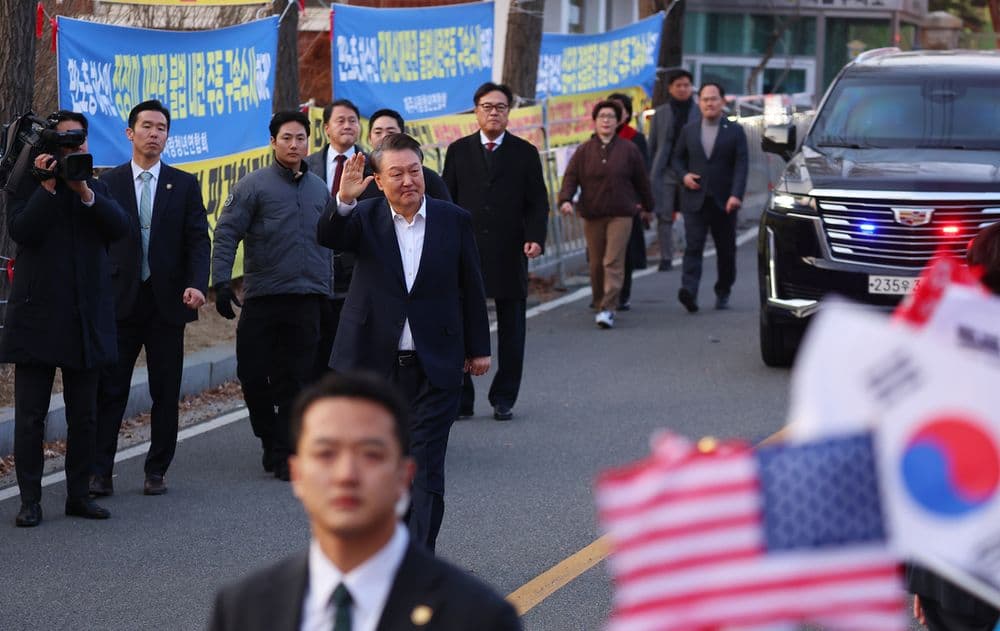Korea in Crisis: The Release of Yoon Suk-yeol and its Repercussions

The Unexpected Release of a Controversial President
On March 8, 2025, Yoon Suk-yeol, the President of South Korea accused of seditious conspiracy, was released after 51 days of arrest. The Seoul Central District Court accepted the request to cancel his detention, arguing irregularities in the judicial process. According to sources close to the matter, the Public Prosecutor's Office chose not to appeal the decision, expediting his release from the Seoul Detention Center.
The Political Whirlwind: Justice or Strategy?
Yoon's release has exacerbated polarization. The ruling People Power Party has demanded the dissolution of the Special Investigation Office (공수처), accusing it of conducting illegal investigations. On the other hand, the opposition Democratic Party blamed Prosecutor General Shim Woo-jung, demanding his immediate resignation and threatening a new impeachment trial. Analysts point out that this judicial move could be an attempt to influence the Constitutional Court's final verdict on the impeachment, expected in the coming days.

Demonstrations: Two Koreas in the Streets
Following the release, Yoon's supporters gathered in front of his official residence in Hannam-dong, waving national flags and chanting slogans against the impeachment. In contrast, civil groups and unions such as the Korean Confederation of Trade Unions (민주노총) held massive protests in Seoul, calling the decision a "blow to democracy." Police deployed 12,000 officers to prevent confrontations, including closing service stations near the Constitutional Court due to risks of sabotage.
The Legal Debate: A Dangerous Precedent?
Legal experts criticized the Public Prosecutor's Office's lack of immediate appeal, something unusual in high-profile cases. The Court cited precedents such as the case of former Supreme Court Chief Justice Yang Seung-tae (2019), where prolonged detentions without trial were questioned. However, independent jurists warn that this decision could weaken anti-corruption protocols, especially after accusations that Yoon attempted to manipulate evidence during his arrest.
Economic and Social Impact
The South Korean stock market recorded sharp declines following the release, while the won depreciated 2.3% against the dollar within hours. Small businesses near protest areas reported losses of 40%, and platforms like DC Inside saw a 70% increase in extremist posts, including threats against judges and journalists. Rapid surveys by Gallup Korea revealed that 58% of young people between 20-30 years reject the measure, contrasting with 67% support among those over 60.
What's Next for Korea?
All eyes are on the Constitutional Court, which must resolve the impeachment before April. If confirmed, he would be the first president removed from office since Park Geun-hye (2017). Meanwhile, Yoon remains in his residence, avoiding public appearances but meeting discreetly with political allies to "stabilize the national situation." International analysts predict that, regardless of the verdict, this episode will leave deep scars on Korean democracy.
The Voice of Social Networks: Between Hope and Skepticism
In online communities like Nate Pann, users compare the case with historical dramas such as The King's Affection, joking: "Is this a Vincenzo plot?" Meanwhile, beauty influencers like Lee Hye-in took advantage of the trend, launching makeup tutorials with "presidential blue" themes and donating proceeds to pro-democracy causes. On the other hand, brands like Innisfree withdrew campaigns associated with national symbols to avoid boycotts.
This event not only redefines Korea's political future but also exposes the generational gaps and the fragile relationship between justice and power. As one user wrote on Naver Blog: "History repeats itself, but this time with Instagram filters and hashtags."
Discover More

The Tragic Departure of Wheesung: A K-pop Icon Who Left Us Too Soon
Singer Wheesung, an emblematic figure of K-pop, died at 43 in Seoul. His death from cardiac arrest has caused shock in the music industry, highlighting his artistic legacy and sparking debates about mental health.

The Historic Ruling that Freed President Yoon Suk-yeol
The Seoul Central Court freed President Yoon Suk-yeol due to procedural irregularities in his arrest, highlighting errors in detention time calculation and questioning the prosecution's competence. The ruling generates divided reactions in South Korean politics and society.